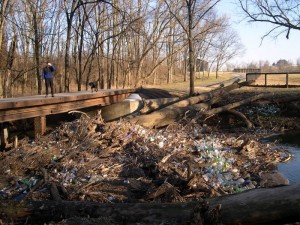Storm Water
Our current storm water system is defunct.
Lexington uses detention and retention basins to control flooding and storm water filtration in its neighborhoods. Because many new homes are built on extremely small lots with poor drainage, it is essential they do their job. Yet, the city has not had enough money to thoroughly maintain these basins. So, when it rains, many of these basins don’t absorb or filter a lot of water. Polluted run-off then floods basements, and nearby streams—compromising our water quality here in Fayette County.
This flooding situation is extremely dangerous. Recently, Lexington residents have lost their lives due to swift stormwater run-off.
Increasing pavement and other impermeable surfaces in Fayette County has made the problem worse.
Often, there is simply not enough “greenspace” to absorb and filter storm water run-off when it rains. Storm water run-off floods our streams, transporting pollutants from the pavement and negatively effecting local fish and aquatic wildlife. According to a new study by the US Geological Survey, when impervious cover reaches just 10% of the watershed area, many types of aquatic insects can decline by as much as one-third. Consequently, the Kentucky Division of Water reported that over 70% of Fayette County streams are impaired and polluted.
We need to think more sustainably about how to address run-off and flooding issues arising from new development. For example, The Fayette Alliance recently supported a change to Lexington’s Zoning Ordinance that allows developers to use “green infrastructure” in new subdivisions. Click Here to read more about this issue.
Stormwater discharge from rural activity centers is not locally monitored…
Despite a local ordinance stating that LFUCG has a duty to regulate the pollution of our natural streams and rivers, The LFUCG Division of Engineering does not monitor the stormwater discharge from areas such as Bluegrass Airport and BlueSky Industrial Park. The runoff from these areas discharges into Fayette County creeks and streams, complicating our pollution issues.
For More Information:
Neighborhood Association Sanitary Sewer Report, 1999
LFUCG Clean Water Task Force, 2006
LFUCG Stormwater Oversight Committee, 2006


